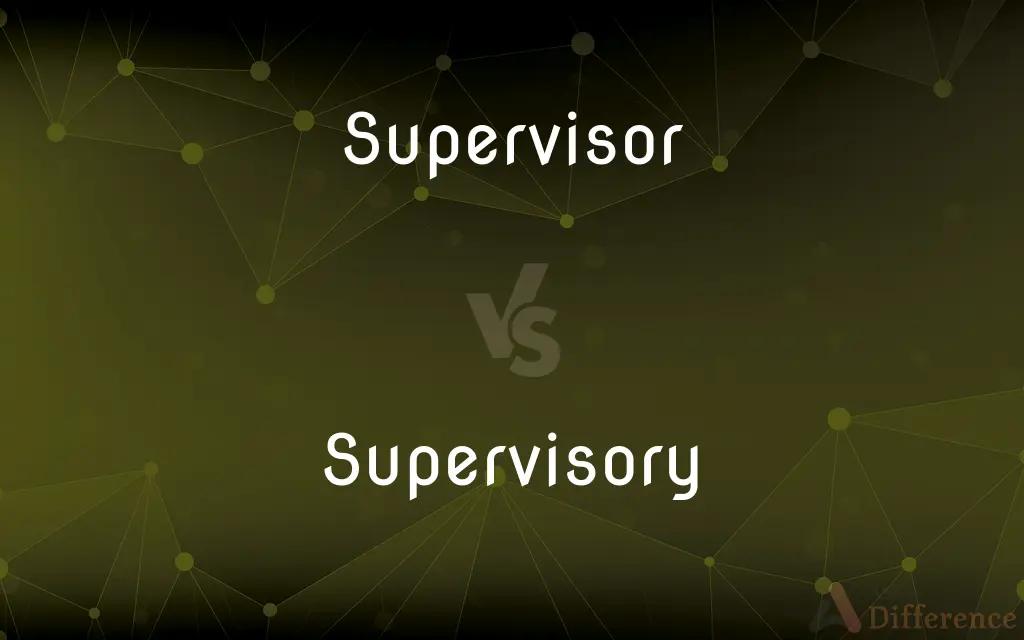Supervisor vs. Supervisory — What's the Difference?
By Tayyaba Rehman & Maham Liaqat — Updated on February 23, 2024
A supervisor is an individual in charge of overseeing the work of others, whereas supervisory relates to the role or authority of overseeing and guiding.

Difference Between Supervisor and Supervisory
Table of Contents
ADVERTISEMENT
Key Differences
The term "supervisor" refers to a person who manages, directs, or oversees the work and performance of others, often within a workplace setting. This role is critical for maintaining productivity, ensuring quality control, and providing guidance and support to employees. In contrast, "supervisory" is an adjective describing anything related to the process or position of supervising. It encompasses activities, responsibilities, and authorities associated with overseeing and guiding the work of others. For instance, a supervisory position involves tasks such as setting goals, evaluating performance, and ensuring adherence to policies and procedures.
A supervisor directly interacts with the team, providing real-time feedback, instructions, and assistance, the concept of supervisory extends beyond personal interaction. It includes developing strategies, policies, and systems that facilitate effective supervision. These strategies might be implemented by supervisors but are part of a broader supervisory framework within an organization.
Supervisors are pivotal in enforcing company policies and standards, directly influencing the work environment and team morale. Their leadership style and approach can significantly impact employee satisfaction and productivity. On the other hand, supervisory practices and guidelines provide a structured approach to management, ensuring consistency and fairness in supervisory actions across different teams and departments.
The effectiveness of a supervisor can be measured by the performance, growth, and satisfaction of their team members. In contrast, the effectiveness of supervisory mechanisms is assessed through the overall efficiency, compliance, and success of organizational management practices.
Supervisors often require a blend of technical skills, interpersonal abilities, and experience in their field to effectively lead their teams. Supervisory roles, however, may also demand a thorough understanding of management theories, organizational behavior, and strategic planning to develop and implement effective supervisory strategies.
ADVERTISEMENT
Comparison Chart
Nature
Person
Adjective describing a role or authority
Function
Direct oversight and management of employees
Pertaining to the process of overseeing
Scope
Individual level
Organizational or departmental level
Skills Required
Leadership, technical skills, communication
Strategic planning, policy development
Outcome Measurement
Team performance and satisfaction
Efficiency and success of management practices
Compare with Definitions
Supervisor
A position requiring decision-making related to team management.
The supervisor approved the team's vacation schedules.
Supervisory
Involving the guidance and direction of employees.
The training focused on enhancing supervisory skills.
Supervisor
One who is in charge of a particular department or unit, as in a governmental agency or school system.
Supervisory
Related to authority or control over others.
She had supervisory control over the finance department.
Supervisor
A person who oversees and directs the work of others.
The supervisor conducted weekly meetings to discuss project progress.
Supervisory
Descriptive of roles or positions with oversight responsibilities.
He was promoted to a supervisory position within the team.
Supervisor
An individual responsible for monitoring and evaluating employee performance.
As a supervisor, she provided constructive feedback to her team.
Supervisory
Of or pertaining to supervision; as, supervisory powers.
Supervisor
Someone holding authority within a workplace to enforce rules and policies.
The supervisor ensured all safety protocols were followed.
Supervisory
Pertaining to the act or process of overseeing work.
His supervisory duties included conducting performance reviews.
Supervisor
A role that involves guiding and supporting team members.
The supervisor mentored new employees during their onboarding process.
Supervisory
Connected to oversight functions in an organization.
Supervisory mechanisms were put in place to ensure compliance.
Supervisor
One who supervises.
Supervisory
Having or relating to the role of observing and directing an activity or a person
Managerial and supervisory staff
The women play a largely supervisory role in the process
Supervisor
(management) A person with the official task of overseeing the work of a person or group, or of other operations and activities.
Supervisory
Of, pertaining to, or in the capacity of a supervisor
Supervisor
One who supervises; an overseer; an inspector; a superintendent; as, a supervisor of schools.
Supervisory
Of or limited to or involving supervision;
In a supervisory capacity
Supervisor
A person who supervises a person or an activity.
Supervisor
A person who monitors someone to make sure they comply with rules or other requirements set for them.
Supervisor
A spectator; a looker-on.
Supervisor
One who supervises or has charge and direction of
Supervisor
A supervisor, or also known as foreman, boss, overseer, facilitator, monitor, area coordinator, or sometimes gaffer, is the job title of a low level management position that is primarily based on authority over a worker or charge of a workplace. A supervisor can also be one of the most senior in the staff at the place of work, such as a Professor who oversees a PhD dissertation.
Common Curiosities
What is the primary role of a supervisor?
The primary role of a supervisor is to oversee, guide, and evaluate the work of employees.
Can a supervisory role involve decision-making?
Yes, supervisory roles often involve decision-making, particularly regarding oversight methods and policies.
Are supervisory skills only important for supervisors?
No, supervisory skills are beneficial for anyone in a leadership or managerial position, not just supervisors.
How can one become a supervisor?
Becoming a supervisor typically requires relevant work experience, leadership skills, and sometimes educational qualifications.
Does supervisory involve only negative feedback?
No, supervisory responsibilities also include providing positive feedback, encouragement, and support.
Are there different styles of supervision?
Yes, there are various supervision styles, including democratic, autocratic, and laissez-faire, each with its approach to leadership.
Is it possible to measure the effectiveness of supervisory practices?
The effectiveness of supervisory practices can be measured through employee performance, satisfaction, and the achievement of organizational goals.
Do supervisory roles require communication skills?
Effective communication is crucial for supervisory roles to convey expectations, feedback, and guidance.
Is every manager a supervisor?
Most managers act as supervisors, but their role can also include broader strategic planning beyond direct supervision.
Can supervisory responsibilities change over time?
Yes, supervisory responsibilities may evolve due to organizational changes, team dynamics, or personal development.
Share Your Discovery

Previous Comparison
Obligatory vs. Mandatory
Next Comparison
Secondary vs. DeuteragonistAuthor Spotlight
Written by
Tayyaba RehmanTayyaba Rehman is a distinguished writer, currently serving as a primary contributor to askdifference.com. As a researcher in semantics and etymology, Tayyaba's passion for the complexity of languages and their distinctions has found a perfect home on the platform. Tayyaba delves into the intricacies of language, distinguishing between commonly confused words and phrases, thereby providing clarity for readers worldwide.
Co-written by
Maham Liaqat













































